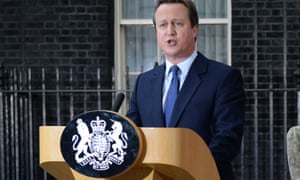
Surely David Cameron will be remembered as one of the most ham-fisted prime ministers in British history.
For party political (ie, personal) reasons he staged the European Union referendum. After making a hash of the remain campaign, he watched __more than half the population defy him by opting for Brexit. Then, with the nation divided, he walked away.
Way before that - and, again, for personal reasons - he set in train a process about the regulation of Britain’s press that has also created deep and lasting divisions.
When the News of the World phone-hacking scandal broke, Cameron found himself embroiled in the controversy. Why? Because he had unwisely hired one of the men at the centre of that scandal: the paper’s former editor, Andy Coulson.
Cameron was therefore unable to take a dispassionate view of the affair and instituted a wide-ranging judicial inquiry into “the culture, practices and ethics of the British press” under Lord Justice Leveson.
Inquiries are political devices designed to delay difficult decisions. Many result in little __more than a bit of tinkering with the status quo. But this one was different. Cameron had unknowingly set the stage for root-and-branch reform.
Sir Brian Leveson’s report called for a radical change to the method of press regulation. Suddenly, the hapless Cameron was a rabbit in the headlights, seemingly unable to decide what to do.
Here was a moment demanding genuine political leadership. Instead, he flunked it. Rather than taking charge of the crucial discussions in the aftermath of the Leveson report on what should be done, he handed the job to an aide.
He kept himself informed, of course. But the stakes were high and required the political clout of a prime minister. At issue, after all, was the principle of press freedom and the practice of press regulation.
Finding a compromise between the advocates of what we might now cast as hard Leveson and soft Leveson would have been difficult and, I concede, may have been impossible.
But there would have been a virtue in doing so in public. The discussions about how to preserve a long-held principle while instituting a new practice surely necessitated transparency. Cameron allowed them to be settled instead at some hole-in-the-corner meeting.
In so doing, he alienated the owners, controllers and editors of the British press. The chances of constructing a compromise were over. The split between the two sides became a chasm.*
While the overwhelming bulk of owners set up a soft Leveson form of regulation through the Independent Press Standards Organisation (Ipso), the hard Levesonians relied on politicians to pass legislation, the 2013 crime and courts act, that enabled a separate form of regulation.
That duly arrived with the creation of the Press Recognition Panel (PRP), the setting up of a separate regulator, Impress, and its recruitment of a bunch of online start-ups to regulate.
But section 40 of the act was, thankfully, not triggered. It is an essential element of the hard Leveson scheme to punish publishers outside the PRP-recognised Impress by requiring them to pay for the costs of libel and privacy claimants regardless of whether they win or lose.
This provision, subject to a public consultation which ends today, has aroused the ire of both British publishers and press freedom organisations across the world. It is clearly inimical to justice.
I accept that publishers have launched a propaganda campaign that may well misrepresent the threat to investigative journalism (because we cannot be certain about the effects of section 40) but you can hardly blame them for seeing no virtue in the section’s provisions.
Note also the antagonism towards section 40 by both non-Ipso publishers and organisations devoted to freedom of expression, such as Index on Censorship (here), the Committee to Protect Journalists (here) and Reporters Without Borders (here).
Section 40 is the ticking time-bomb left by Cameron. I cannot imagine this government putting it into effect (the consultation process is a blatant political sham), but it will remain on the statute book.
In the future, a different government could dare to throw caution to the wind. Thank you so much David Cameron, for all you have done.
*Arguably, there was a three-way split because some owners/editors - notably at the Guardian, Financial Times, Independent and Private Eye - maintained neutrality.